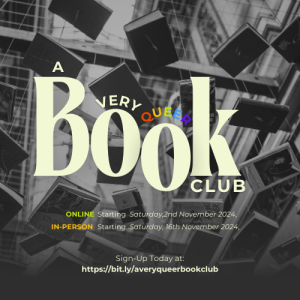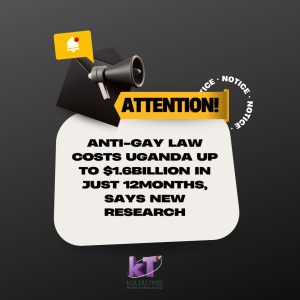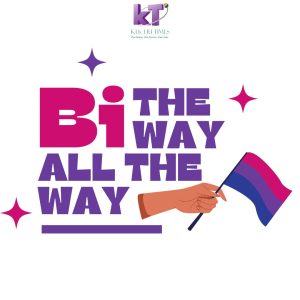8th October is International Lesbian Day, a celebration that initially started in New Zealand and Australia in 1990 and has now been adopted by the global LGBTI movement. The day is intended to celebrate lesbian culture, resilience, beliefs, struggles as well as their contribution to the movement as a whole.
To celebrate this year, we will be reproducing an article from PATHFINDERS. The piece focuses on renowned LGBTI rights activist who is also the Executive Director of Kuchu Times Media Group, Kasha Jacqueline Nabagesera. The article was featured in PATHFINDER’s Champions for Change Project
Kasha Nabagesera is an LGBTQI rights activist based in Uganda. In 2003, Nabagesera founded Freedom and Roam Uganda (FARUG), a lesbian, bisexual, and queer organization that advocates for women’s rights and equality, both within LGBTQI communities and in society more broadly. She worked on the Hate No More campaign to encourage better representations of same-sex relationships in Ugandan media and created the web-based platform Kuchu Times and the print magazine Bombastic Magazine which is distributed countrywide to share stories of LGBTQI lives and issues.
For her work, Nabagesera has been honored with many awards among them the Matin Ennals Award for Human Rights Defenders in 2011 and the Nuremberg International Human Rights Award in 2013, and the Right Livelihood Award 2015. In 2016, Kasha was a recipient of a fellowship from Stanford University, Center on Democracy, Development and the Rule of Law.
We spoke with Kasha Nabagesera to learn more about her work and what drives her:
What ignited your pursuit for safe and peaceful societies?
I decided to work in this field because I was angry at my university for attempting to expel me in my final year simply because of who I love. I felt I had reached a point where I was not going to allow to be expelled again especially since all my schooling life I had always been expelled for who I love. So enough was enough and something needed to be done. That is when I realized that I was not the only one being affected and yet no one was saying anything. That was the starting point. So in 1999, I decided to openly disobey my university because I needed to complete my schooling and I had done nothing wrong so I openly started socially organizing LGBT friends to hang out openly at the university and in every socializing place. I have never looked back since then.
To achieve a peaceful, just, and inclusive world, what does success look like to you? And what are the key factors in achieving this vision?
Having all social justice movements working together and not in isolation. Knowing that the intersectionalities of our being are what will help all of us achieve what we are working towards. We must not fear engaging in dialogue with the oppressors. We cannot afford to hide and shy away from them. We need to speak up, no matter how controversial the matter. Demanding for change requires getting uncomfortable. We must begin to see a world where resources not only belong to an elite few men and women in our countries. A world where power is not be abused and respects equality, freedom, and justice. A world where equity prevails. A world where everyone is equal.
How does your work significantly reduce and prevent violence?
The goal of my work is to push forward a just and inclusive society. A society where there are reduced inequalities and more so a society that understands that discrimination hinders development. A society that does not discriminate.
How has COVID-19 impacted your work? Are there any lessons learned from the pandemic that you hope to apply in future work?
Where do I start? It’s been a very trying period. The vulnerable have become more vulnerable. Our resources centers have been forced to close, and we haven’t been able to reach as many people as previously to meet even just the most basic of needs. Many community members haven’t been able to stay in the shelters because of the emergency measures, which is forcing many people to reside at home where they may face a greater risk of violence from their tormentors. This has resulted in a rise of mental health issues, and our toll lines are constantly engaged with callers asking for help.
The loss of jobs, schools closing, and abandonment is also leaving many members of our community to survive on hand to mouth. As a small group of “underground organizations”, we offer stipend to volunteers of the community and some employment per projects. With the pandemic, many of these programs have stalled.
As a result, homeless has become a country-wide challenge. Emergency measures imposed have also considerably affected community resilience, people’s ability to communicate and engage freely without fear of violence, arrest or discrimination. And we also bear in mind that we are not a pariah community, as all Ugandans are affected. Many may hate us, but we are part and parcel of the society and we shall do all it takes to change their mindsets towards us and so we feel for them and not forgetting many of our members are breadwinners too.
One of the main lessons from this pandemic is to SAVE, SAVE, SAVE. More importantly, I have learnt to rely on diverse means of working. I have learnt to be patient and how to strengthen my personal resilience. This has been incredibly important because I bear the stresses and responsibilities of my personal life, my community and my organization. I have also learnt to say NO because I cannot save everyone or solve every problem. This has been a very huge wake up call for me. I have also learnt to the importance of our environment to building a more peaceful world, after seeing how forests are disappearing in my country. I plan to teach my community to be environmental conscious in all activities we carry out. I want to a see a world with as many new trees planted to preserve our environment. For the future of our world.
What advice do you have for those seeking to make a difference for a more peaceful world?
To LISTEN, LISTEN, LISTEN. People should not close doors because those seeking an audience or dialogue are not decision-makers, politicians, or leaders. At times we may feel our voice does not matter, but we are the grassroots. Our everyday needs, struggles, and plights matter. We matter. We must not be quick to judge ourselves or let ourselves be judged.
Dialogue is also critical. We need opportunities to exchange ideas and learn from countries that are more peaceful and inclusive. Not everything will work for everyone, but at least there are lessons and experiences that may be worth learning from each other.
At all times, we must remember where the world has come from and know that this world is not definite. A year ago, no one even imagine the world would lose so many people in such a short period of time. Not until that it knocks on your door.
ABOUT CHAMPIONS FOR CHANGE
Champions of Change is an initiative started by the Pathfinders to highlight advocates who have made an impact in their communities and have helped to create peaceful, just and inclusive societies (SDG16+). It provides an opportunity to feature individuals, businesses, and organizations doing extraordinary things to empower and inspire members of their communities. As part of the Movement to Halve Violence by 2030, hear from Champions who have made building peaceful societies their cause and mission in life, and learn what you can do to join them!
To read the original article and more pieces from Champions for Change, click the link below
https://medium.com/sdg16plus/the-ugandan-activist-fighting-for-lgbtqi-rights-cc4ca3bd935c




